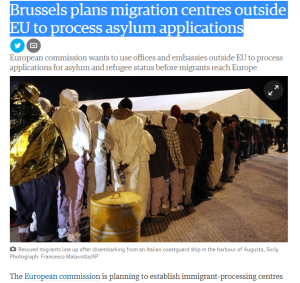
The Guardian reports that the European commission wants to open offices (or using existing ones) in third countries to process asylum applications. The article validly points out that similar proposals have been tabled in the past but never reached the implementation stage. The new EU commissioner for home affairs, Dimitris Avramopoulos, signals a u-turn on the matter… but for how long? Proposals like this are easier to write on paper than implement in practice and would require a significant devolvement of financial and human resources. The ‘side effects’ of such a move also involve some more in-depth thinking.
If one were to use the information in The Guardian article to make a judgement, it would seem that the EC is still a long way to go to move from the policy announcement to a serious policy development and impact assessment. The article refers interchangeably to asylum and immigration processing centres, is this what the EU policy makers are saying or is the result of a journalist with little appreciation of the difference between forced and economically-driven migration? I frankly don’t know at this point.
For now, as everyone who has tried to migrate or even just visit the EU from most of the countries listed in the article know, a visit to a EU consulate often hundreds of kilometers away from one’s home is a requirement for applying for a visa. Long queues, bribes and frustration are common experience for aspiring migrants. Some EU member states, like The Netherlands, even require people to undertake language tests before ever set foot in Europe. Incidentally, it would be fascinating to find out how many Dutch language teachers are available in sub-Saharan Africa (especially outside of capital cities). So, in many ways, offshore migrant processing centers already exit and there is plenty of evidence that indicate that are often dysfunctional if not corrupt and, more importantly, don’t really provide a response to the demand for migration of the majority of aspiring migrants – ie people will just continue to try their lack on rickety boats. Given their track records on migration, it would be cause of great concern if these offices were to be tasked with assessing also asylum applications. If the proposals are about asylum only, there are other considerations that may ultimately lead the EC to abandon the initiative. It is no secret that the aim of the policy is to decrease illegal crossings in the Mediterranean, would such initiative address this policy goal? In short: No. It is over ten years that similar proposals championing externalisation of asylum processing are on the table but they never fully reach implementation stage. The most obvious risk for forced migrants is that by opening asylum processing centres abroad EU member states will make access to asylum procedure impossible at home – ie everyone who manages to reach EU shores or airports may see his/her asylum application automatically rejected because if he/she was a ‘genuine’ refugee would have applied abroad.
This risk may be cause of concern for migrants and activists but not enough to stop the proposal from happening. What may succeed is exactly the opposite scenario. Assuming that it may be possible through a sustained effort of NGOs and campaigners to force a decent monitoring system on these asylum centres (which is not easy), the most obvious risk for EU countries is that if they open asylum processing centres and they comply to minimum standard of decency if not fairness in the way they handle asylum applications, this could ultimately lead to an increase of refugees in the EU as more people would have access to the application process once the obstacle of a very dangerous and expensive journey across the Mediterranean is removed, and this is not what the EU member states want.

This is opening a very interesting policy debate(s), if it is ever going to happen. Is it the journalist or the EU policy makers that forgot to draw a distinction between the ‘forced’ and ‘economicaly-driven’ migrants? Hard to tell really. Maybe it just slowely blurres away by the tricky interplay of policy and practice? One would hope this plans to be a trigger point in a collective action towards ‘the European asylum system’. However, I am afraid that Mr. Avramopoulos is just encouraged by some EU member states to ‘adjust’ the boundaris of the ‘Fortress of Europe’ by shifting the barricades (and possibly the burden) to the countries of transit. I agree that this will actually lead to the opposite scenario. It will create a paradox where by creating illusory access to mobility and legality a new array of undocumented migration will thrive. This might open a pandora box by NGO’s and campaigners bringing to the global attention the enormity of the problem and illustrating the inability of the EU to collectively address this on-going issue.
Reblogged this on Refugee Archives @ UEL.